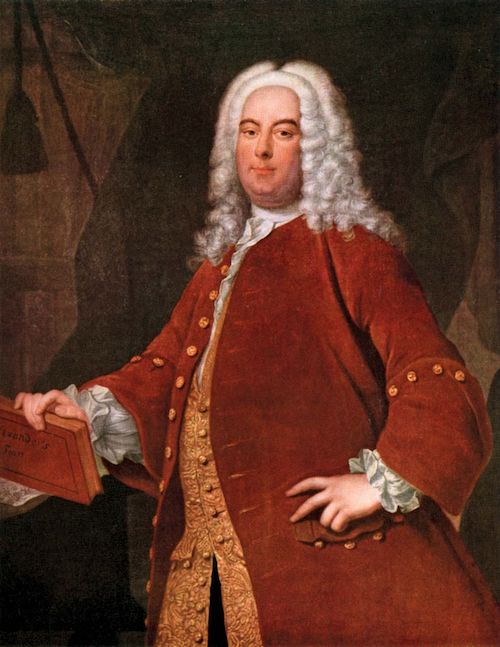Bedeviled by Covid, Seraphic Fire still offers inspired “Messiah” moments

Handel’s Messiah was performed by Seraphic Fire Friday night in Coral Gables. Composer painting by Thomas Hudson, 1736
Handel’s Messiah must be the most frequently performed choral work worldwide. In any given year, performances abound around the Christmas and Easter holidays.
After offering repeated highlights programs in past years. Seraphic Fire presented a complete performance of Handel’s evergreen masterpiece on Friday night at First United Methodist Church in Coral Gables.
This is only the second time Seraphic Fire has done a complete Messiah and this presentation is truly complete. Artistic director Patrick Quigley led every number in Handel’s score, including arias often omitted or included in an appendix in recordings. The only edited part of the presentation was the short cut in the “Pastoral Symphony” that Handel himself made.
Alas, Covid-19 and other related health problems plagued the performance. Several of the soloists had to be replaced during the week as well as a group of the choral artists from the choir’s UCLA Ensemble Artist Program.
Under the circumstances, it was remarkable that Quigley was able to bring off the performance as convincingly as he did. Quigley is very much the master of this beloved score and if there is one South Florida music organization that can bring audiences a great Messiah, it is Seraphic Fire.
From the initial bars of the overture to the final joyous and triumphant “Amen,” Quigley directed a crisp, incisive realization. Deploying modern, rather than period, instruments, Quigley drew clean, vigorous playing from the ensemble, led by concertmaster Dina Kostic.
The full, resonant sonority of the choir’s entrance in “And the glory of the Lord” indicated that, despite substitutions, the firmness and keen musicianship of the chorus remained strongly potent. Voices were agile and vividly present for “And He shall purify.” Quigley engendered dance-like verve in ”For unto us a child is born” and brought the Part One (the Nativity sequence) to a spirited finish with “Glory to God” and “His yoke is easy.”
In the second section, Quigley drew out the darkness of “Behold the lamb of God” and the commentary on Jesus’ crucifixion and death while never allowing momentum to become overly heavy. The only miscalculation was an overblown “Hallelujah” Chorus that was too loud, pushed too hard and overemphatic–the one time Quigley lost the score’s pulse.
Choral singing in the crucial final part was outstanding. The contrasts between the solemn opening of “Since by man came death” and the invigorating pages that followed were splendidly projected with corporate unanimity and transparent contrasts of dynamics. The men’s voices were strongly focused and present at the beginning of the final chorus. Throughout the evening, Quigley’s command of the work’s architecture was impressive. Each aria and chorus related to the next in a masterful progression that fully encompassed the oratorio’s epic journey.
The variable quality of the soloists was the reading’s weak point. Some were brought in on short notice; others were given additional assignments as well as their previously scheduled solo duties. All gave their best efforts under difficult circumstances. Still, some of the arias were wanting in projection, intelligibility and idiomatic affinity.
The male vocalists fared best. Tenor Steven Soph, long one of Seraphic Fire’s finest singers, stepped in to sing the first recitative and aria “Comfort ye” and “Every valley” and was, in very way, outstanding. His diction was clear and he phrased elegantly. Coloratura runs were impeccably assayed and his top was devoid of pressure or strain. In his narrative of the Passion sections, Soph’s lyric tenor delivered the text with a fine combination of finesse and fervor. Brad Diamond displayed a heroic tenor instrument in ”Thou shalt break them,” sung with intensity and great projection.
This group has never lacked for fine bass voices and that was again evident. Steven Eddy’s firm bottom range and dramatic declamation gave a commanding “Thus saith the Lord” and reverberated powerfully in “Why do the nations?” Chris Talbot, a late addition, displayed a bass of warmth and strength, making “The people that walked in darkness” a highlight of the Nativity section. John Buffett took the full measure of “The trumpet shall sound” in full voiced yet mellow tones. Josh Cohen’s trumpet obbligato proved thrilling.
Among the female voices, Amanda Crider stood out. Her rich timbre, agility and finely chiseled shaping of long phrases ennobled “O thou that giveth” and “Thou art gone up on high.” Emily Marvosh’s lighter alto contributed a nicely spun “But who may abide” and she evidenced a flair for drama in the central section of “He was despised.” Wearing a mask (as were two other singers and the string players), Gabriela Solís’ voice did not always come through. Her words were often unintelligible and her duet with Soph unbalanced.
Rebecca Myers’ bright soprano and dexterity had the appropriate vibrancy and verve for “Rejoice” and the angel narrative, less so for the more soulful “If God be for us.” Elisse Albian’s opulent soprano was a wonderful discovery, briefly glimpsed in “Come unto him.” Tonia D’Amelio’s lovely sound was compromised by poor delivery of “How beautiful are the feet.” A game Jessica Beebe stepped into “I know that my redeemer liveth” but her slender voice and unsteady singing made for a bland rendering.
For all the problems and flaws of this Messiah, there was much that was musically inspired, particularly Quigley’s direction and the terrific choral singing. One hopes that he will again attempt a full Messiah, next time with a healthy ensemble contingent and front-line soloists
Seraphic Fire repeats Messiah 7:30 p.m. Saturday at All Saints Episcopal Church in Fort Lauderdale and 4 p.m. Sunday at St. Mark Greek Orthodox Church in Boca Raton. seraphicfire.org
Posted in Uncategorized
Leave a Comment
Sat Apr 30, 2022
at 2:22 pm
No Comments






